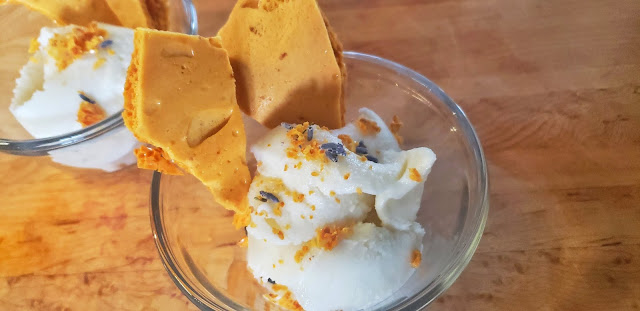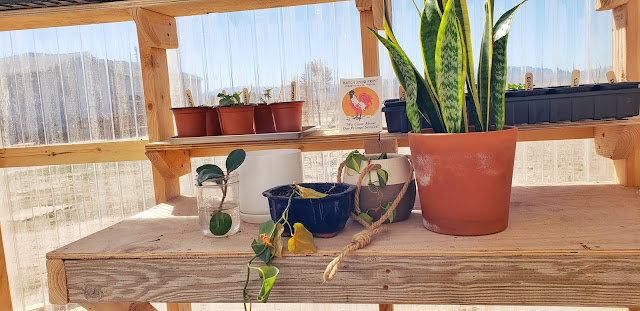Tips for Making the Most of your Groceries and Reducing Waste
When we moved to Tule Peak Ranch I made a real effort to start learning (or re-learning since I grew up in a rural area as well) ways to stretch the life and food and reduce waste -- both food waste and rubbish. Food waste and trash in the United States is a huge problem and while it's worth noting that the biggest impact on reducing waste can be made at the commercial/structural level, that's no reason that we shouldn't do out part as individuals, too. Plus reducing how much food we waste saves money and means we have to go to the store less often (a very good thing these days). That said, all we can do is our best and doing something to reduce waste is better than doing nothing.
And these days, since we're all going to the grocery store less and buying more, hoping it will last longer, I thought I'd share a few tips I've put into regular practice, links to more resources, and a couple recipes.
Freeze Food Before it Goes Bad
And these days, since we're all going to the grocery store less and buying more, hoping it will last longer, I thought I'd share a few tips I've put into regular practice, links to more resources, and a couple recipes.
 |
| Jars of tomato sauce and salsa (made from garden tomatoes) that I froze |
Freeze Food Before it Goes Bad
I freeze everything. If you think a food is going to go bad before you'll have a chance to eat it, you can probably freeze it. The classic example is brown bananas. I keep a glass container in our freezer and whenever a banana starts to look too brown, I peel it, slice it into small pieces and put it in the container. When I have enough, there are a host of things I can use them for, like banana bread, smoothies, or vegan ice cream.
-----
Ice Cream Recipe
I got this recipe from Sky Runner by Emelie Forsberg. If you're a runner,
I highly recommend this book. Her approach to running and training for
running is incredibly balanced and lovely. Plus, she shared some
amazing recipes, like this one:
amazing recipes, like this one:
Frozen banana slices; Milk (she uses oat milk, I usually have almond
milk on hand); Flavoring such as cocoa, berries, jam, or vanilla powder.
(I usually throw in a handful of frozen blueberries and a spoonful of cocoa.)
milk on hand); Flavoring such as cocoa, berries, jam, or vanilla powder.
(I usually throw in a handful of frozen blueberries and a spoonful of cocoa.)
Place everything in a blender and process until smooth and about the
consistency of soft serve ice cream. I like to top mine with chopped walnuts :)
-----
The other day I realized I had some onions that were going soft so I chopped them up and froze them. You can freeze most vegetables. (Side note: Freezing fresh vegetables instead of buying them already frozen is a great way to reduce plastic waste, too.)
When I bake bread I usually make two loaves. One for now and the other I slice and freeze for later. I do the same when I make hamburger buns and just take out the number of buns I need as I need them.
Speaking of hamburger buns, I also make big batches of black bean/lentil burgers and freeze those.
You can almost always freeze dough. When I make blueberry scones, I freeze them at the step before baking.
I keep a lot of extra butter in our freezer for baking (and because I'm from the South, I suppose).
Freeze limes and then take them out one at a time, microwave for 30 seconds and voila! (Not recommended for larger citruses like lemons and oranges.)
You can even freeze milk!
I try to freeze most things in glass containers, avoiding plastic if at all possible. To freeze soups, sauces and stocks in a mason jar, I fill the jar, leaving about an inch or so of space at the top. Then I put the lid on loosely and freeze it overnight. The next morning I just tighten the lid.
 |
| Pickled Radishes |
If you have a bunch of basil, make pesto. Pesto will keep for quite a while in the freezer. Another way to make herbs last longer is to dry them.
You can preserve or pickle a lot of foods like lemons, jalapenos, cucumbers, onions, and more. Here's our recipe for Quick Pickled Radishes.
If you have tomatoes that are starting to go bad, simply cut away the bad spots and make tomato sauce. (Yep, you can freeze tomato sauce.)
If you have a bunch of different veggies that you need to use, consider making a vegetable soup. And speaking of soup...
Save Vegetable Scraps for Stock
The main ingredients for vegetable stock are onions, carrots and celery but there are plenty of other veggies you can add. I keep a container in our freezer and add veggie scraps to it gradually. Once I have enough, I make stock.
I wash and save the stalks, ends and peels from leeks, garlic, winter squash, potatoes, eggplant, chard, lettuce, bell peppers, scallions, beet greens, asparagus, and cilantro.
Not all vegetables are good for stock and some are better off in your compost like broccoli, Brussels sprouts, cauliflower, cabbage and others.
Here's a webpage I check if I'm unsure if, or how much of, a particular vegetable or herb should end up in my stock.
-----
If you want an idea for something to do with your stock, consider making pho.
We're all thinking about ways to boost our immune systems these days and pho
broth contains star anise, cloves, and cinnamon which are antiviral.
I shared a pho recipe recently on Instagram.
We're all thinking about ways to boost our immune systems these days and pho
broth contains star anise, cloves, and cinnamon which are antiviral.
I shared a pho recipe recently on Instagram.
Regrow Vegetables
I have to admit, I don't usually do this but I think it's pretty cool, especially if you don't have a lot of space. Here's a Buzzfeed article with more info: 16 Foods That You Can Magically Regrow from Scraps.
Compost
If you absolutely must throw out food, compost it instead! If you have the space, start your own compost and use it on your garden -- full circle!
Things you shouldn't compost: dairy, meat, pet waste, highly acidic foods, baked goods, oily/greasy food.
---
Note: I've been a vegetarian for over 20 years, so I don't have any tips for meat. But it would be especially sad if an animal gave it's life for nothing, so please don't waste meat... I bet you can freeze it.




Comments
Post a Comment